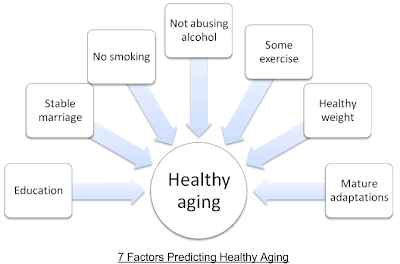Secrets to a better life
Long ago, during one of those adolescent lows, I read many books searching for the meaning of life (pretty funny considering I was 11 at the time!). My conclusion was to be happy, and to make those we love happy. So when I saw the title "What makes us happy?" of a recent The Atlantic article by Joshua Wolf Shenk, I just had to study it.
Background
This article is about the Harvard Study of Adult Development, a longitudinal study (small sample, long periods of time) conducted since 1937 in search of elements that make a good life. The study follows 268 Harvard healthy, well-adjusted male sophomores through the course of their life. When budget allowed, surveys were sent out every 2 years to these men, physicals were conducted every 5 years, and in-person interviews were conducted every 15 years. over 80% of these men served during WWII, 1/3 of them had some form of mental illness by 1950 (by their mid 30s). While men in this study remain anonymous, some participants became identified: JFK and Ben Bradlee.
So what were the findings? There were two main findings:
- 7 factors predicting healthy aging: better make sure you have at least 5-6 of these!
- 4 adaptations to troubles/difficulties: grow into mature adapations
7 Factors predicting healthy aging
By the time the Harvard men reached 50, of the 105 (39%) who have 5-6 of the 7 factors predicting healthy aging, 50% of them end up at 80 years of age as "happy-well". Only 7.5% were classified as "sad-sick".
Of the men who have 3 or elss of these 7 factors, 0 of them ended up as "happy-well" at 80. In fact, men in this group are 3x more likely to be dead at 80.
George Vaillant, the current chief of this study who has been following these Harvard men for since the 60s, found that it's not about how much trouble/difficulties the men faced that affected their healthy aging; it's more about how they respond to those difficulties. A mature adaptation/response (more details below) is crucial to health aging. While we can't always control what happens around/to us, we can control how we respond to the situations.
Furthermore, Vaillant found that social aptitude is the 2nd most dominant factor to successful aging.
"The men’s relationships at age 47, he found, predicted late-life adjustment better than any other variable, except defenses. Good sibling relationships seem especially powerful: 93 percent of the men who were thriving at age 65 had been close to a brother or sister when younger. "
Response to Trouble
As we mature, so does our adapation to troubles/difficulties. Adolescents are 2x more likely to use immature adaptations while the Harvard study shows that altruism and humor grew in men between ages of 50-70. Mature adaptation is one of the most dominant factors crucial to healthy aging.
Amongst the mature adaptations:
- Suppression represents a conscious decision to postpone handling of an issue. This is different from repression, a neurotic adaptation, which may involve memory lapse.
- Sublimation means putting into productive action or finding an outlet for one's trouble
For more information about definition of the different adaptations, scroll down to the bottom third of page 2 of the article.
Alcoholism, industriousness, positive vs. negative emotions
A few additional interesting nuggets from the article:
- In addition to the Harvard study, George Vaillant also adopted a study of junvenile delinquents in inner-city Boston, run by criminologists Sheldon and Eleanor Glueck. These men came from poor families with mostly foreign-born parents and 29% becoming college grduates. Although the Glueck men were 50% more likely than the Harvard men to become alcoholic; they were also 2x more likely to get sober. The Glueck's men's higher likelihood to become sober probably has something to do with hitting rock bottom.
- It was found in the Glueck study that industriousness, such as part-time job, chores, extra-curricula activities, predicted adult mental health better than any other factor, including family cohesion and warm maternal relationships.
- Happiness is a positive emotion that makes us vulnerable as it is future oriented, even though it's better for us in the long-term. By contrast, negative emotions such as fear and sadness gives immediate gratification and insulates us. It's the easy way out!
For those thirsting to learn more, grab a cup of coffee and read Joshua's full article at The Atlantic. It's been an interesting read. Thanks, Joshua!




Comments